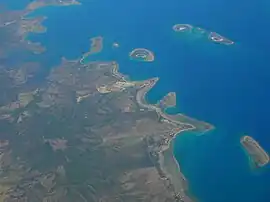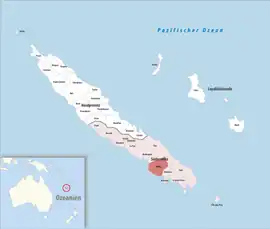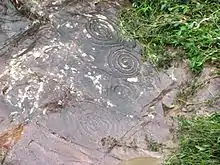Païta | |
|---|---|
 An aerial view of Païta | |
 Location of the commune (in red) within New Caledonia | |
Location of Païta | |
| Coordinates: 22°08′01″S 166°21′02″E / 22.1337°S 166.3505°E | |
| Country | France |
| Sui generis collectivity | New Caledonia |
| Province | South Province |
| Government | |
| • Mayor (2020–2026) | Willy Gatuhau[1] |
| Area 1 | 699.7 km2 (270.2 sq mi) |
| Population (2019)[2] | 24,563 |
| • Density | 35/km2 (91/sq mi) |
| Ethnic distribution | |
| • 2019 census | Kanaks 22.31% Wallisians and Futunans 19.83% Europeans 19.74% Mixed 15.72% Other 22.4% |
| Time zone | UTC+11:00 |
| INSEE/Postal code | 98821 /98890 |
| Elevation | 0–1,618 m (0–5,308 ft) (avg. 30 m or 98 ft) |
| 1 New Caledonia Land Register (DITTT) data, which exclude lakes and ponds larger than 1 km² (0.386 sq mi or 247 acres) as well as the estuaries of rivers. | |
Païta (French pronunciation: [pajta]) is a commune in the suburbs of Nouméa in the South Province of New Caledonia, an overseas territory of France in the Pacific Ocean. New Caledonia's international airport, La Tontouta International Airport, is located there.
Geography
Climate
Païta features a tropical savanna climate (Köppen: Aw). The average annual temperature in Païta is 23.3 °C (73.9 °F). The average annual rainfall is 851.9 mm (33.54 in) with March as the wettest month. The temperatures are highest on average in February, at around 26.9 °C (80.4 °F), and lowest in July, at around 19.5 °C (67.1 °F). The highest temperature ever recorded in Païta was 38.1 °C (100.6 °F) on 4 March 1997; the coldest temperature ever recorded was 6.3 °C (43.3 °F) on 8 August 1957.
| Climate data for Païta (La Tontouta, 1991−2020 normals, extremes 1951−present) | |||||||||||||
|---|---|---|---|---|---|---|---|---|---|---|---|---|---|
| Month | Jan | Feb | Mar | Apr | May | Jun | Jul | Aug | Sep | Oct | Nov | Dec | Year |
| Record high °C (°F) | 37.5 (99.5) |
37.9 (100.2) |
38.1 (100.6) |
35.7 (96.3) |
33.2 (91.8) |
33.2 (91.8) |
32.6 (90.7) |
31.1 (88.0) |
34.8 (94.6) |
35.1 (95.2) |
36.8 (98.2) |
37.5 (99.5) |
38.1 (100.6) |
| Mean daily maximum °C (°F) | 31.7 (89.1) |
31.7 (89.1) |
30.6 (87.1) |
29.0 (84.2) |
27.0 (80.6) |
25.4 (77.7) |
24.5 (76.1) |
24.8 (76.6) |
26.7 (80.1) |
28.6 (83.5) |
30.2 (86.4) |
31.5 (88.7) |
28.5 (83.3) |
| Daily mean °C (°F) | 26.6 (79.9) |
26.9 (80.4) |
26.1 (79.0) |
24.4 (75.9) |
22.3 (72.1) |
20.7 (69.3) |
19.5 (67.1) |
19.6 (67.3) |
20.8 (69.4) |
22.7 (72.9) |
24.3 (75.7) |
25.9 (78.6) |
23.3 (73.9) |
| Mean daily minimum °C (°F) | 21.5 (70.7) |
22.1 (71.8) |
21.6 (70.9) |
19.7 (67.5) |
17.5 (63.5) |
16.0 (60.8) |
14.6 (58.3) |
14.3 (57.7) |
15.0 (59.0) |
16.8 (62.2) |
18.4 (65.1) |
20.3 (68.5) |
18.1 (64.6) |
| Record low °C (°F) | 14.7 (58.5) |
15.6 (60.1) |
12.2 (54.0) |
12.0 (53.6) |
9.0 (48.2) |
6.8 (44.2) |
6.4 (43.5) |
6.3 (43.3) |
7.8 (46.0) |
8.9 (48.0) |
10.7 (51.3) |
13.4 (56.1) |
6.3 (43.3) |
| Average precipitation mm (inches) | 94.9 (3.74) |
122.0 (4.80) |
133.9 (5.27) |
73.0 (2.87) |
64.2 (2.53) |
64.1 (2.52) |
57.9 (2.28) |
65.9 (2.59) |
28.3 (1.11) |
23.9 (0.94) |
40.4 (1.59) |
83.4 (3.28) |
851.9 (33.54) |
| Average precipitation days (≥ 1.0 mm) | 8.4 | 9.6 | 10.1 | 6.4 | 7.0 | 6.8 | 6.9 | 6.6 | 3.8 | 3.2 | 4.1 | 6.3 | 79.2 |
| Mean monthly sunshine hours | 219.6 | 182.7 | 182.9 | 174.3 | 163.0 | 146.1 | 166.2 | 191.7 | 221.3 | 249.3 | 239.1 | 239.8 | 2,376 |
| Source 1: Météo-France[3] | |||||||||||||
| Source 2: Service de la météorologie de la Nouvelle-Calédonie[4] | |||||||||||||
Population
| Year | Pop. | ±% p.a. |
|---|---|---|
| 1956 | 1,397 | — |
| 1963 | 1,903 | +4.51% |
| 1969 | 2,522 | +4.81% |
| 1976 | 3,407 | +4.39% |
| 1983 | 4,834 | +5.12% |
| 1989 | 6,049 | +3.81% |
| 1996 | 7,862 | +3.82% |
| 2004 | 12,062 | +5.50% |
| 2009 | 16,358 | +6.28% |
| 2014 | 20,616 | +4.74% |
| 2019 | 24,563 | +3.57% |
| Source: ISEE[5] | ||
Sights



The Catholic church in the centre of Paita was built in 1875. The modern Cultural Centre in the High Street is used for various exhibitions and cultural performances. The Town Hall (Mairie) is close by.
About one mile from the town centre to the north, is the former railway station of the Nouméa-Païta railway where a small locomotive which was used until 1940 can be seen.[6]
In the southeast of Paita petroglyphs possibly dating from the 13th or 14th century B.C. can be seen on a rock at a small river. Some of the petroglyphs look similar to the sun or to flowers. From the road the place can be reached by cement stairs behind a wooden pavilion.[7]
References
- ↑ "Répertoire national des élus: les maires" (in French). data.gouv.fr, Plateforme ouverte des données publiques françaises. 13 September 2022.
- ↑ Population, ménages et logement par commune, en 2019, Institut de la statistique et des études économiques Nouvelle-Calédonie
- ↑ "Fiche Climatologique Statistiques 1991-2020 et records" (PDF). Météo-France. Retrieved August 26, 2022.
- ↑ "climate of Païta 1981-2010" (PDF) (in French). Météo-France. Retrieved April 7, 2022.
- ↑ ISEE. "Structure de la population et évolutions: La population aux différents recensements". Retrieved 23 February 2021.
- ↑ Piere Grundmann: Nouvelle Calédonie, p. 110. Paris 2012
- ↑ Pierre Grundmann: Nouvelle Calédonie, p. 242. Paris 2012
External links